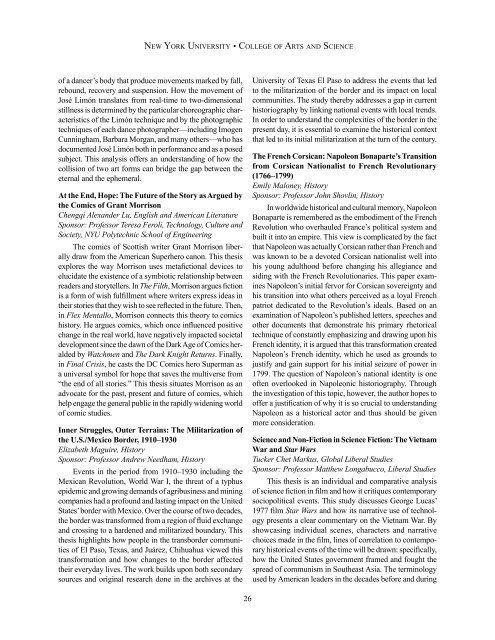INQUIRY
InquiryXIX
InquiryXIX
You also want an ePaper? Increase the reach of your titles
YUMPU automatically turns print PDFs into web optimized ePapers that Google loves.
New York University • College of Arts and Science<br />
of a dancer’s body that produce movements marked by fall,<br />
rebound, recovery and suspension. How the movement of<br />
José Limón translates from real-time to two-dimensional<br />
stillness is determined by the particular choreographic characteristics<br />
of the Limón technique and by the photographic<br />
techniques of each dance photographer—including Imogen<br />
Cunningham, Barbara Morgan, and many others—who has<br />
documented José Limón both in performance and as a posed<br />
subject. This analysis offers an understanding of how the<br />
collision of two art forms can bridge the gap between the<br />
eternal and the ephemeral.<br />
At the End, Hope: The Future of the Story as Argued by<br />
the Comics of Grant Morrison<br />
Chengqi Alexander Lu, English and American Literature<br />
Sponsor: Professor Teresa Feroli, Technology, Culture and<br />
Society, NYU Polytechnic School of Engineering<br />
The comics of Scottish writer Grant Morrison liberally<br />
draw from the American Superhero canon. This thesis<br />
explores the way Morrison uses metafictional devices to<br />
elucidate the existence of a symbiotic relationship between<br />
readers and storytellers. In The Filth, Morrison argues fiction<br />
is a form of wish fulfillment where writers express ideas in<br />
their stories that they wish to see reflected in the future. Then,<br />
in Flex Mentallo, Morrison connects this theory to comics<br />
history. He argues comics, which once influenced positive<br />
change in the real world, have negatively impacted societal<br />
development since the dawn of the Dark Age of Comics heralded<br />
by Watchmen and The Dark Knight Returns. Finally,<br />
in Final Crisis, he casts the DC Comics hero Superman as<br />
a universal symbol for hope that saves the multiverse from<br />
“the end of all stories.” This thesis situates Morrison as an<br />
advocate for the past, present and future of comics, which<br />
help engage the general public in the rapidly widening world<br />
of comic studies.<br />
Inner Struggles, Outer Terrains: The Militarization of<br />
the U.S./Mexico Border, 1910–1930<br />
Elizabeth Maguire, History<br />
Sponsor: Professor Andrew Needham, History<br />
Events in the period from 1910–1930 including the<br />
Mexican Revolution, World War I, the threat of a typhus<br />
epidemic and growing demands of agribusiness and mining<br />
companies had a profound and lasting impact on the United<br />
States’ border with Mexico. Over the course of two decades,<br />
the border was transformed from a region of fluid exchange<br />
and crossing to a hardened and militarized boundary. This<br />
thesis highlights how people in the transborder communities<br />
of El Paso, Texas, and Juárez, Chihuahua viewed this<br />
transformation and how changes to the border affected<br />
their everyday lives. The work builds upon both secondary<br />
sources and original research done in the archives at the<br />
University of Texas El Paso to address the events that led<br />
to the militarization of the border and its impact on local<br />
communities. The study thereby addresses a gap in current<br />
historiography by linking national events with local trends.<br />
In order to understand the complexities of the border in the<br />
present day, it is essential to examine the historical context<br />
that led to its initial militarization at the turn of the century.<br />
The French Corsican: Napoleon Bonaparte’s Transition<br />
from Corsican Nationalist to French Revolutionary<br />
(1766–1799)<br />
Emily Maloney, History<br />
Sponsor: Professor John Shovlin, History<br />
In worldwide historical and cultural memory, Napoleon<br />
Bonaparte is remembered as the embodiment of the French<br />
Revolution who overhauled France’s political system and<br />
built it into an empire. This view is complicated by the fact<br />
that Napoleon was actually Corsican rather than French and<br />
was known to be a devoted Corsican nationalist well into<br />
his young adulthood before changing his allegiance and<br />
siding with the French Revolutionaries. This paper examines<br />
Napoleon’s initial fervor for Corsican sovereignty and<br />
his transition into what others perceived as a loyal French<br />
patriot dedicated to the Revolution’s ideals. Based on an<br />
examination of Napoleon’s published letters, speeches and<br />
other documents that demonstrate his primary rhetorical<br />
technique of constantly emphasizing and drawing upon his<br />
French identity, it is argued that this transformation created<br />
Napoleon’s French identity, which he used as grounds to<br />
justify and gain support for his initial seizure of power in<br />
1799. The question of Napoleon’s national identity is one<br />
often overlooked in Napoleonic historiography. Through<br />
the investigation of this topic, however, the author hopes to<br />
offer a justification of why it is so crucial to understanding<br />
Napoleon as a historical actor and thus should be given<br />
more consideration.<br />
Science and Non-Fiction in Science Fiction: The Vietnam<br />
War and Star Wars<br />
Tucker Chet Markus, Global Liberal Studies<br />
Sponsor: Professor Matthew Longabucco, Liberal Studies<br />
This thesis is an individual and comparative analysis<br />
of science fiction in film and how it critiques contemporary<br />
sociopolitical events. This study discusses George Lucas’<br />
1977 film Star Wars and how its narrative use of technology<br />
presents a clear commentary on the Vietnam War. By<br />
showcasing individual scenes, characters and narrative<br />
choices made in the film, lines of correlation to contemporary<br />
historical events of the time will be drawn: specifically,<br />
how the United States government framed and fought the<br />
spread of communism in Southeast Asia. The terminology<br />
used by American leaders in the decades before and during<br />
26


